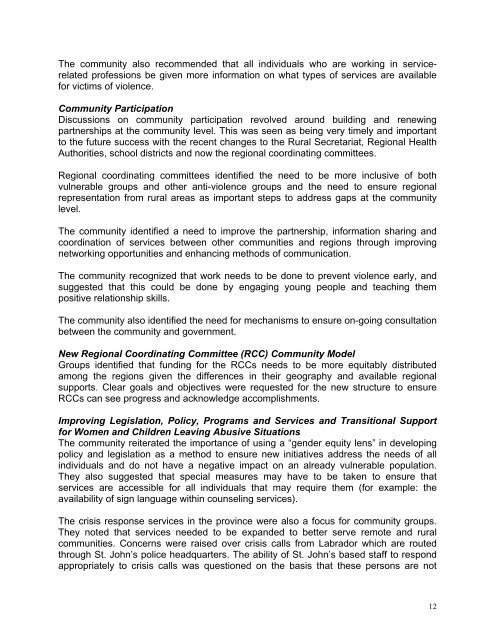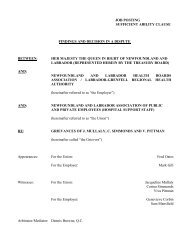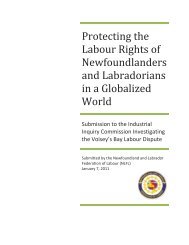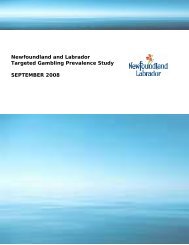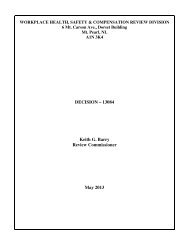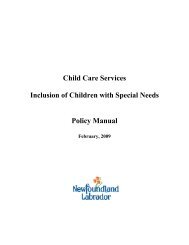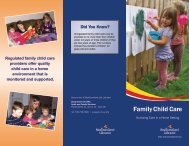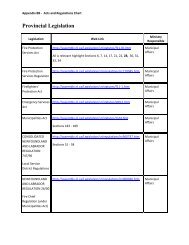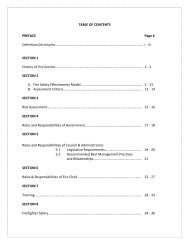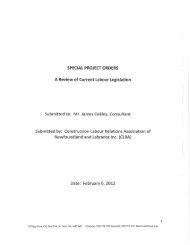Taking Action Against Violence - Government of Newfoundland and ...
Taking Action Against Violence - Government of Newfoundland and ...
Taking Action Against Violence - Government of Newfoundland and ...
Create successful ePaper yourself
Turn your PDF publications into a flip-book with our unique Google optimized e-Paper software.
The community also recommended that all individuals who are working in servicerelated<br />
pr<strong>of</strong>essions be given more information on what types <strong>of</strong> services are available<br />
for victims <strong>of</strong> violence.<br />
Community Participation<br />
Discussions on community participation revolved around building <strong>and</strong> renewing<br />
partnerships at the community level. This was seen as being very timely <strong>and</strong> important<br />
to the future success with the recent changes to the Rural Secretariat, Regional Health<br />
Authorities, school districts <strong>and</strong> now the regional coordinating committees.<br />
Regional coordinating committees identified the need to be more inclusive <strong>of</strong> both<br />
vulnerable groups <strong>and</strong> other anti-violence groups <strong>and</strong> the need to ensure regional<br />
representation from rural areas as important steps to address gaps at the community<br />
level.<br />
The community identified a need to improve the partnership, information sharing <strong>and</strong><br />
coordination <strong>of</strong> services between other communities <strong>and</strong> regions through improving<br />
networking opportunities <strong>and</strong> enhancing methods <strong>of</strong> communication.<br />
The community recognized that work needs to be done to prevent violence early, <strong>and</strong><br />
suggested that this could be done by engaging young people <strong>and</strong> teaching them<br />
positive relationship skills.<br />
The community also identified the need for mechanisms to ensure on-going consultation<br />
between the community <strong>and</strong> government.<br />
New Regional Coordinating Committee (RCC) Community Model<br />
Groups identified that funding for the RCCs needs to be more equitably distributed<br />
among the regions given the differences in their geography <strong>and</strong> available regional<br />
supports. Clear goals <strong>and</strong> objectives were requested for the new structure to ensure<br />
RCCs can see progress <strong>and</strong> acknowledge accomplishments.<br />
Improving Legislation, Policy, Programs <strong>and</strong> Services <strong>and</strong> Transitional Support<br />
for Women <strong>and</strong> Children Leaving Abusive Situations<br />
The community reiterated the importance <strong>of</strong> using a “gender equity lens” in developing<br />
policy <strong>and</strong> legislation as a method to ensure new initiatives address the needs <strong>of</strong> all<br />
individuals <strong>and</strong> do not have a negative impact on an already vulnerable population.<br />
They also suggested that special measures may have to be taken to ensure that<br />
services are accessible for all individuals that may require them (for example: the<br />
availability <strong>of</strong> sign language within counseling services).<br />
The crisis response services in the province were also a focus for community groups.<br />
They noted that services needed to be exp<strong>and</strong>ed to better serve remote <strong>and</strong> rural<br />
communities. Concerns were raised over crisis calls from Labrador which are routed<br />
through St. John’s police headquarters. The ability <strong>of</strong> St. John’s based staff to respond<br />
appropriately to crisis calls was questioned on the basis that these persons are not<br />
12


